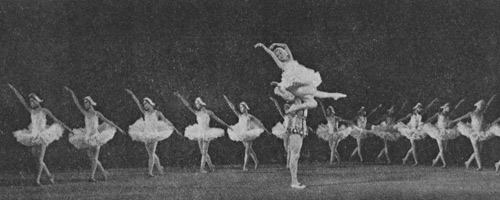|
 |
|
From Scene Two, Swan Lake. Pai Shu-hsiang as Odette and Liu Ching-tang as the Prince with the corps de ballet of the Peking School of Dancing |
The performance of Tchaikovsky's Swan Lake at Peking's Tienchiao Theatre was a big event in the history of dancing in China: it was the first full-length classical ballet ever staged by a Chinese ballet troupe.
It was a pretty bold attempt. The Peking School of Dancing was only set up in 1954 and produced this ballet in a little over four months after rehearsals for it began.
A fifth-year student of the school, 18-year-old Pai Shu-hsiang danced Odette, the ill-fated princess bewitched and transformed into a swan, and also Odile, her sinister "double" conjured up by the wizard to deceive her lover, Prince Siegfried. The Prince, who by vanquishing the wizard frees her and her swan companions from the spell, was danced by Liu Ching-tang, a young teacher at the school.
Despite the lack of experience of the dancers whose average age was sixteen, the success of the evening was due to three things: the expert nature of the general production - choreography, decor and costumes - the youthful zest and infectious sincerity of the dancers and the lovely music of Tchaikovsky ably performed by the symphony orchestra of the Central Newsreel and Documentary Film Studio under Chang Ning-ho. The dances of the corps de ballet of courtiers and peasants in the first scene and the various divertissements in the palace scene, Italian and Spanish character dances, were skilfully and attractively executed.
All of this would have been impossible without the expert guidance of P.A. Gusev of the Soviet Union and the other Soviet teachers at the school. They taught the company the version of the ballet produced by the Moscow Stanislavsky and Nemirovich-Danchenko Musical Theatre, but made skilful adaptations to suit the level of attainments of their pupils, who with only four to five years of classical training, naturally still have quite a way to go to reach fully professional standards.
Swan Lake makes heavy demands on the dancer. Not only does it need a high level of technical skill and stamina, but comprehension of a foreign romantic tradition far removed from the experience of the average member of the young company. Rehearsals were intensive and, after dancing, every evening the whole company would gather together to familiarize themselves with the music, and to rehearse their parts again in their minds as they listened.
In essaying a part made famous by the leading ballerinas of the world, Pai Shu-hsiang took on a task of no few difficulties. The first was the traditional 32 fouettés in Odile's coda. Training for this demanded the ability to make at least two hundred of these rapid turns on her pointes in practice each day. Hardly had she mastered the more difficult set steps, solos and pas de deux than she was faced with fresh demands-character delineation and dramatic expression. Curiously enough this gentle-faced young dancer found it, as she says, and as her performance proved, easier to dance the wicked Odile than the good Odette.
This premiere showed that Peking now has the beginnings of a serious classical troupe that should be coming to maturity in the next few years. | 